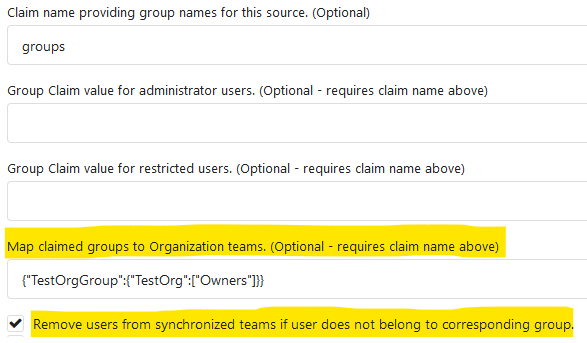Backport #31874 by @bohde
In the OpenID flows, the "CfTurnstileSitekey" wasn't populated, which
caused those flows to fail if using Turnstile as the Captcha
implementation.
This adds the missing context variables, allowing Turnstile to be used
in the OpenID flows.
Co-authored-by: Rowan Bohde <rowan.bohde@gmail.com>
(cherry picked from commit 0affb5c775280622b277bba2223c01968bafa8b7)
Since `modules/context` has to depend on `models` and many other
packages, it should be moved from `modules/context` to
`services/context` according to design principles. There is no logic
code change on this PR, only move packages.
- Move `code.gitea.io/gitea/modules/context` to
`code.gitea.io/gitea/services/context`
- Move `code.gitea.io/gitea/modules/contexttest` to
`code.gitea.io/gitea/services/contexttest` because of depending on
context
- Move `code.gitea.io/gitea/modules/upload` to
`code.gitea.io/gitea/services/context/upload` because of depending on
context
(cherry picked from commit 29f149bd9f517225a3c9f1ca3fb0a7b5325af696)
Conflicts:
routers/api/packages/alpine/alpine.go
routers/api/v1/repo/issue_reaction.go
routers/install/install.go
routers/web/admin/config.go
routers/web/passkey.go
routers/web/repo/search.go
routers/web/repo/setting/default_branch.go
routers/web/user/home.go
routers/web/user/profile.go
tests/integration/editor_test.go
tests/integration/integration_test.go
tests/integration/mirror_push_test.go
trivial context conflicts
also modified all other occurrences in Forgejo specific files
Part of #27065
This reduces the usage of `db.DefaultContext`. I think I've got enough
files for the first PR. When this is merged, I will continue working on
this.
Considering how many files this PR affect, I hope it won't take to long
to merge, so I don't end up in the merge conflict hell.
---------
Co-authored-by: wxiaoguang <wxiaoguang@gmail.com>
To avoid duplicated load of the same data in an HTTP request, we can set
a context cache to do that. i.e. Some pages may load a user from a
database with the same id in different areas on the same page. But the
code is hidden in two different deep logic. How should we share the
user? As a result of this PR, now if both entry functions accept
`context.Context` as the first parameter and we just need to refactor
`GetUserByID` to reuse the user from the context cache. Then it will not
be loaded twice on an HTTP request.
But of course, sometimes we would like to reload an object from the
database, that's why `RemoveContextData` is also exposed.
The core context cache is here. It defines a new context
```go
type cacheContext struct {
ctx context.Context
data map[any]map[any]any
lock sync.RWMutex
}
var cacheContextKey = struct{}{}
func WithCacheContext(ctx context.Context) context.Context {
return context.WithValue(ctx, cacheContextKey, &cacheContext{
ctx: ctx,
data: make(map[any]map[any]any),
})
}
```
Then you can use the below 4 methods to read/write/del the data within
the same context.
```go
func GetContextData(ctx context.Context, tp, key any) any
func SetContextData(ctx context.Context, tp, key, value any)
func RemoveContextData(ctx context.Context, tp, key any)
func GetWithContextCache[T any](ctx context.Context, cacheGroupKey string, cacheTargetID any, f func() (T, error)) (T, error)
```
Then let's take a look at how `system.GetString` implement it.
```go
func GetSetting(ctx context.Context, key string) (string, error) {
return cache.GetWithContextCache(ctx, contextCacheKey, key, func() (string, error) {
return cache.GetString(genSettingCacheKey(key), func() (string, error) {
res, err := GetSettingNoCache(ctx, key)
if err != nil {
return "", err
}
return res.SettingValue, nil
})
})
}
```
First, it will check if context data include the setting object with the
key. If not, it will query from the global cache which may be memory or
a Redis cache. If not, it will get the object from the database. In the
end, if the object gets from the global cache or database, it will be
set into the context cache.
An object stored in the context cache will only be destroyed after the
context disappeared.
Fixes #19555
Test-Instructions:
https://github.com/go-gitea/gitea/pull/21441#issuecomment-1419438000
This PR implements the mapping of user groups provided by OIDC providers
to orgs teams in Gitea. The main part is a refactoring of the existing
LDAP code to make it usable from different providers.
Refactorings:
- Moved the router auth code from module to service because of import
cycles
- Changed some model methods to take a `Context` parameter
- Moved the mapping code from LDAP to a common location
I've tested it with Keycloak but other providers should work too. The
JSON mapping format is the same as for LDAP.

---------
Co-authored-by: Lunny Xiao <xiaolunwen@gmail.com>
Change all license headers to comply with REUSE specification.
Fix #16132
Co-authored-by: flynnnnnnnnnn <flynnnnnnnnnn@github>
Co-authored-by: John Olheiser <john.olheiser@gmail.com>
Enable this to require captcha validation for user login. You also must
enable `ENABLE_CAPTCHA`.
Summary:
- Consolidate CAPTCHA template
- add CAPTCHA handle and context
- add `REQUIRE_CAPTCHA_FOR_LOGIN` config and docs
- Consolidate CAPTCHA set-up and verification code
Partially resolved #6049
Signed-off-by: Xinyu Zhou <i@sourcehut.net>
Signed-off-by: Andrew Thornton <art27@cantab.net>
Co-authored-by: Andrew Thornton <art27@cantab.net>
* Apply DefaultUserIsRestricted in CreateUser
* Enforce system defaults in CreateUser
Allow for overwrites with CreateUserOverwriteOptions
* Fix compilation errors
* Add "restricted" option to create user command
* Add "restricted" option to create user admin api
* Respect default setting.Service.RegisterEmailConfirm and setting.Service.RegisterManualConfirm where needed
* Revert "Respect default setting.Service.RegisterEmailConfirm and setting.Service.RegisterManualConfirm where needed"
This reverts commit ee95d3e8dc.
Migrate from U2F to Webauthn
Co-authored-by: Andrew Thornton <art27@cantab.net>
Co-authored-by: 6543 <6543@obermui.de>
Co-authored-by: wxiaoguang <wxiaoguang@gmail.com>